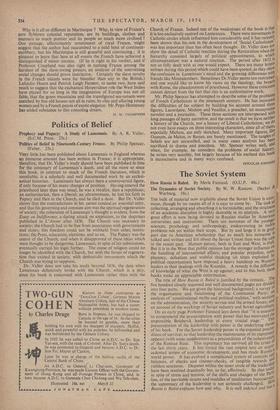York Stock Exchange, which has now been confirmed by the
company. The signifi- cance of this move has been keenly appreci- ated by the investing public. The New York Stock Exchange makes more demands on listed companies in the interests of the investor than does the London Stock Exchange. It expects them, for example, to issue quarterly accounts and to keep their issued capital in line with the real capital employed. This may not be an absolute law, '0r 9 per cent. of the companies listed still Publish accounts half-yearly, but even if Royal Dutch were allowed to escape quarterly accounts it would be a welcome change to have half-yearly statements of earnings from the Royal Dutch-Shell group, which in the Past has been one of the most secretive combines in the industrial world. The Principle behind the New York listing requirements is the right one—to quote their own words: "The investor who owns, buys or contemplates buying listed securities is entitled to adequate information about the corporation which will entitle him to make his investment decisions intelligently." if Only the same rule applied to London!
What New York Does for the Investor I was not invited to the lunch which the Stock Exchange gave last week to the President of the New York Stock Exchange,
Keith Funston, but I can guess what that distinguished visitor talked about. Dr. runston is a strong believer in bringing the stock markets to the masses and he does it by the use of enlightened publicity and instalment buying. Last year he spent '350,000 on brochures, booklets, films and lectures and he believes that it helped to bring in their 250,000 new investors of 1953. The security hire-purchase scheme is, of course, aimed at the small investor. Since THE new Stock Exchange Account which opened on Wednesday is the one before the Budget and the firmness of markets was per- haps significant. There was quite a specu- lative following in the gilt-edged market after institutional buying, which was' going longer,' had already caused a fair rise. These specu- latols will be very disappointed if there is no lowering of Bank rate to 3 per cent. If the Chancellor decides to follow the American and Continental leads and make money cheaper in order to encourage industrial investment I cannot help thinking that he will first try to disarm Labour criticism by tightening up the taxation of such capital gains as the Samuels and the Clores have been making. The trouble about cheaper money, politically, is that it is bound to cause a further boom on the Stock Exchange. But even without a lower Bank rate a Budget designed to help industrial investment through ;better depreciation allowances and a revision of profits tax would strengthen the industrial share markets. Meanwhile the stream of bonuses is by no means dried up. An unexpected one last week was British Plaster Board.
system and 'selling' the equity share to the masses shows up the comparative failure of the London Stock Exchange to do any- thing comparable. It is no use their con- sulting advertising agents. These specialists are excellent at selling merchandise but not at selling new, ideas to the people. The film and the two•booklets the Stock Exchange has produced failed to make any impression on the public mind. While the Stock Exchange has been silent the Left opposition has been busy broadcasting its propaganda and adding to the body of opinion which claims that it is wrong to increase dividends or hand out bonus shares and that undistri- buted reserves belong to the workers. To combat these erroneous ideas it is necessary for the Stock Exchange to conduct a con- tinuous publicity campaign on the widest possible front.
(20 per cent.). At 18s. 9d to yield at least 5.3 per cent. the shares are still reasonably valued.
Company Notes
By CUSTOS


































 Previous page
Previous page